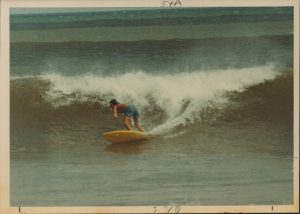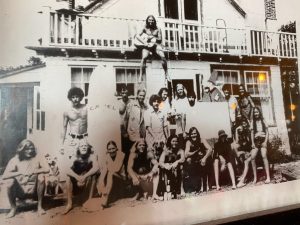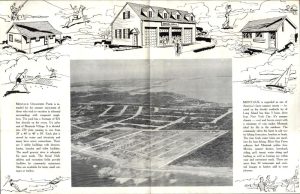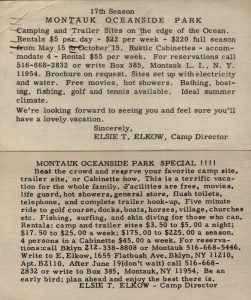
After Ruth Woodrow died in 1983, Bessi Hochstein wrote a letter to the East Hampton Star describing her memories of boarding at Mrs. Woodrow’s cabins in Shepherd’s Neck.
“The first time I was in Montauk was early spring, 1979, the year before I entered college,” she wrote, “I came, like hordes of others my age, looking for a summer job and a place to stay. Finding nothing for the latter in the classifieds, my friend and I went to the Chamber of Commerce and were directed to Woodrow’s Cottages.”
“That summer, Montauk was my paradise and Mrs. Woodrow was a large part of it. I was in to see her, as were others, before I went to work every morning, and again after work, to help her hang out the laundry. “
Ruth (Baker) Woodrow was the sister of Hilda (Baker) Tuma, who married Frank J. Tuma. Mrs. Woodrow and her husband, Reuben, who died in 1968, owned and operated Woodrow’s Cabins on South Elroy Drive, renting them out in summer. By the 1970s, Woodrow’s was still in existence, only now as an affordable place to crash for young people who came to Montauk to surf, party, and work.
Mrs. Woodrow was characterized by her nephew, Frank Tuma, as “a ‘mother’ or ‘grandmother’ to the kids who stayed there,’” the Star said in her obituary in 1983, noting that she baked fresh breads and cakes for “some 30 young people who summered with her.”
The obituary went on to quote another former boarder, Kathleen McCarthy, who spent three summers while in college. She said Mrs. Woodrow was willing to help boarders in almost any way, “whether by going over to the police station to set bail or just to sit and listen to boyfriend troubles.”

“I spent summers in Montauk in the early ’70s, hanging with the dog-in-the-bed-of-the-truck-with-a-bandanna group,” one of them, Jacqueline (Beh) Clark, told the Star in 2012. “We chambermaided, clerked, waitressed by night and played at the beach by day. I lived everywhere from Olsen’s Cabins to the Lakeside Inn.”

Another option for transient young people was the Montauk trailer park at Ditch Plains, also known as Oceanside Estates or the Oceanside Trailer Park, and today as Montauk Shores Condominiums. According to a 1985 photo caption in the Star, a 29-by-50-foot campsite cost $20 a week in 1969 – nowhere near the millions some pay today to purchase a trailer on a tiny plot for use as a changing cabana.
“There were also cabanas, bungalows and cabooses … at least two bathhouses and a small ‘general store’” run by Elsie Elkow in a former chicken coop, according to the Montauk Shores website. “The community … began its heritage years ago as a rustic seaside campsite for many adventurous pioneers who would pitch a tent or just sleep out under the stars.”

Today, visitors to Montauk tend to expect more luxurious places to stay, and cabins and fishing shacks seem to be nearing extinction. Do you have any photos from the days when young men and women squeezed together to crash before rolling out of bed to wait tables, tackle the waves, or crawl the bars? If so we’d love to see them; email archives@montauklibrary.org.

Reply or Comment